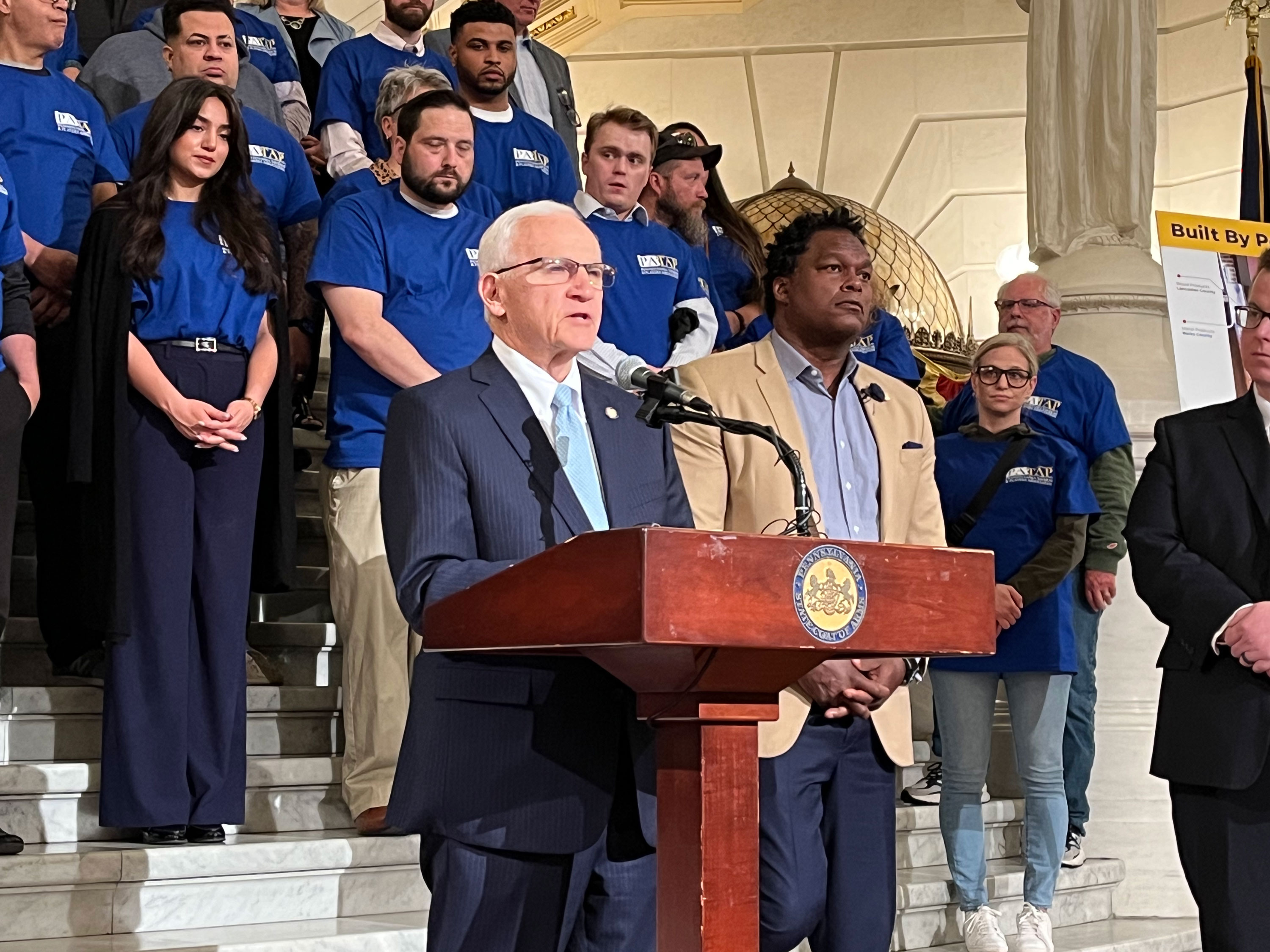Capitol Beat
In the battle over how to legislate skill games, everyone is playing for keeps
With looming court rulings and potential budget deficits, is it time to bet on skill games regulation?

How to best regulate games of skill has become a major topic of conversation in Harrisburg. Pace-O-Matic
It’s not by chance that so-called games of skill – untaxed, unregulated video gaming machines that look like slot machines – remain one of the most talked-about, most divisive issues in Pennsylvania government.
The games resemble video slot machines, but both manufacturers and the courts have determined that winnings are determined by a player’s skill at a particular game rather than by chance. Because of that distinction, courts in Pennsylvania have determined that skill games fall outside of the state’s Gaming Act, and are thus not subject to the same regulations and taxes as slot machines.
The machines, which can currently be found in bars, convenience stores, gas stations and fraternal clubs, have drawn a unique mix of supporters and detractors. Small business owners have touted them as a key source of supplemental income. Manufacturers of the games say taxing and regulating them could provide a much-needed new revenue stream for the state. Meanwhile, the casino industry has steadfastly opposed regulating the games, and public safety advocates fear the games could lead to an increase in crime and worsen addiction issues in the commonwealth.
Shades of gray
The games fall into a regulatory gray area – and are sometimes called “gray games” for that reason. Several court decisions, including a 2023 opinion from Pennsylvania’s Commonwealth Court, have found that Pennsylvania Skill-branded games – developed by the Georgia-based Pace-O-Matic – are not slot machines and are not illegal, allowing them to remain in various locations across the state.
In a majority Commonwealth Court opinion filed on Nov. 30, 2023, Judge Lori A. Dumas wrote: “The POM machines at issue in this case are not slot machines as commonly defined. Accordingly, these electronic games are not illegal per se.”
Speaking to City & State in an interview, Kevin O’Toole, the executive director of the Pennsylvania Gaming Control Board, said the agency is currently following court decisions regarding how to regulate the games. “Right now, there were opinions by the Commonwealth Court of Pennsylvania that indicated that if they were predominantly skill-based, they’re not unlawful under the crimes code. So that is the state of the law right now, pending any decisions by the Supreme Court.”

Because they are not categorized as slots, nor are they gambling devices, they aren’t taxed or regulated like traditional gaming machines. Accordingly, proponents have argued that skill games present a golden opportunity for the state at a time when lawmakers need to be considering and developing new sources of revenue.
“I think timing is everything sometimes. I remember being very involved in the budgeting in 2011 through 2017-18. It was incredibly difficult to balance the budget,” said Mike Barley, a spokesperson for Pace-O-Matic. “I think if you would have had this proposal out there at that time, it would have been a lot easier discussion because there was a need for revenue. That need hasn’t been there, but it’s coming.”
Funds and games
Two of Pennsylvania’s political leaders have signaled a willingness to take action to tax and regulate skill games, which are currently untaxed because they fall outside the purview of the state’s chief gaming law.
With the release of his 2024 budget proposal, Democratic Gov. Josh Shapiro called on lawmakers in the General Assembly to pass legislation that would regulate the games. His budget proposal estimated that with a 42% tax on daily gross gaming revenue from skill games, more than $150 million could have been generated in the 2024-25 fiscal year, but the budget was passed without any such action.
However, with the state’s Independent Fiscal Office recently projecting that the state’s General Fund budget surplus could evaporate by the end of the 2025-26 fiscal year, a looming budget deficit could spur lawmakers to search for a new source of tax revenue, with skill games and legalizing cannabis being two of the most high-profile options.
Speaking to reporters this month, Shapiro said he hopes to see skill games legislation taken up by lawmakers this fall.
“I’m hopeful that we’ll be able to find a way to get skill games done together with a piece on mass transit,” Shapiro said, adding that Senate Majority Leader Joe Pittman has indicated he would like to see skill game tax revenue used to address mass transit needs. “Sen. Pittman has made clear he wants to marry those two issues together. I don’t have an objection to that, but I want to see that get done.”

Pittman, in an interview with City & State, acknowledged that skill games revenue could be used to address both mass transit needs and infrastructure improvements.
“I have made it clear that if we’re having a transit discussion, that discussion cannot occur without infrastructure as well. We have never addressed transit or infrastructure without dealing with both of them, and so I don’t see a pathway to deal with just transit. If we’re going to deal with both issues, I don’t see where we find revenue through existing streams to meet those interests,” he said. “So I have suggested that the only potential revenue stream that I see out there of any magnitude is games of skill – and if a portion of that could be used for transit and infrastructure, I think it’s at least worth considering.”
Barley noted that in addition to serving as a potential source of revenue to help fill state coffers, skill games are already providing an influx of money to small businesses in Pennsylvania – a key point lawmakers should keep in mind, he advised.
“We look at it from an industry standpoint: These small businesses, convenience stores the fraternal clubs – without this supplemental revenue, they would be really, really facing difficult times. We count on those locations to provide services in the communities, and by and large, they’re mostly Pennsylvanian-owned businesses. It’s multifaceted, and there’s a lot of different benefits the games provide,” he said.
Skills and safety
While skill games are often talked about in terms of revenue and regulatory concerns, there’s also the element of public safety.
District attorneys in Pennsylvania have, at times, expressed trepidation about the impact of such games on communities.
In a letter sent to Shapiro in February of this year, Brian Sinnett, president of the Pennsylvania District Attorneys Association, and Kelly Callihan, the association’s executive director, highlighted concerns about crime they said were related to games of skill.
“Law enforcement has seen an increase in crime related to the proliferation of the machines,” they wrote, mentioning the arrest of two men in 2023 accused of robbing 25 machines at gas stations and convenience stores in the Philadelphia area – an arrest that was made while Shapiro was still attorney general.
“Unlike the highly regulated casinos in our state, the local establishments with skill game machines generally have minimum security and are easily observed by and accessible to children. Each machine contains a cash box containing untraceable cash, making them targets for thieves seeking to break into the machines,” the two wrote. “These unlicensed and unregulated skill games have put a strain on law enforcement in many communities. We sympathize with the owners of the establishments that rely on these machines for extra income, but we must recognize that there are societal costs with their operation.”
The letter called for Shapiro and policymakers to regulate skill games, adding that any legislation “should include consumer protection measures, security requirements, and mechanisms to prevent underage use.”
Pittman added that his biggest concern with games of skill revolves around so-called mini-casino parlors that house skill games.
“I certainly think we’ve already seen some anecdotal evidence where some of these mini-parlors, in particular, have been hijacked or been robbed,” he told City & State. “It doesn’t seem like they have very stringent oversight or very regulated facilities. I think that that certainly leads to concerns of public safety.”

Barley stressed that Pace-O-Matic supports regulating the industry in a way that proactively addresses issues like the mini-casinos Pittman referenced.
“We agree there needs to be regulations put in place and guardrails put in place to ensure public safety, to ensure that the games that are being put on the streets are actually skill games and not slot machines or other devices masquerading as skill games,” he said. “Whatever compromise is collectively agreed upon in the legislature is going to have a limit on the games per location and what those location types may be.”
Legislative likelihood
With a court case over skill games looming and the state simultaneously facing a need for new revenue sources, it’s unclear when and whether lawmakers will establish a regulatory framework for skill games.
Pittman acknowledged that regulating skill games is a “very complex” issue, though he said he doesn’t think lawmakers should wait for the Pennsylvania Supreme Court to act on appeals.
“I don’t think we should be influenced by any potential schedule of the courts,” Pittman said. “The reality is, this is extraordinarily complex. We need to be thoughtful about trying to get this right, and whatever timeframe that takes, whatever that looks like, to me the most important thing is that if we’re going to step into a regulatory-taxation framework on this issue, we have to do it the right way.
“We have to do it (in a way) that it equates to the very simple mathematical problem that we have in Harrisburg, which is 26, plus 102, plus one,” he added – a reference to the 26 votes needed to pass a bill in the state Senate, the 102 votes needed in the state House and the governor’s signature.
Barley retained a sense of optimism despite years of efforts to get a legislative framework developed and enacted in Harrisburg.
“I think we’re getting closer to getting a resolution that’s going to work for everybody,” he said. “It’s going to be a compromise. Nobody’s going to absolutely love it on any side, but I think we’re getting closer.”
Harrison Cann contributed to this story.
